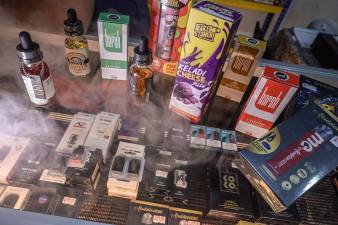KUCHING: Deputy Minister of Youth, Sports and Entrepreneur Development Datuk Dr Ripin Lamat has called on young business owners to transition away from the vaping industry and explore more socially beneficial entrepreneurial opportunities.
Speaking to media representatives following his participation at the Girl Guides Health Carnival 2025 at the Kuching South City Council facility today, Ripin voiced strong endorsement for the Sarawak government’s planned phased prohibition on vaping products.
“I fully endorse the Sarawak administration’s initiative to prohibit vaping products, as the harmful consequences significantly exceed any economic benefits.
“Vaping, particularly liquid variants, poses serious threats to our youth and younger demographics, potentially undermining the moral foundation of future generations.
“Therefore, I support Sarawak’s vaping prohibition,“ the deputy minister stated.
Ripin encouraged young entrepreneurs to redirect their business focus toward industries that deliver more meaningful societal contributions rather than continuing in the vaping sector.
“My advice is to identify alternative business opportunities that are more appropriate and can contribute to our society’s development. Vaping produces severely negative impacts and has been misused among young people, affecting our entire community. It has the potential to weaken family structures, communities, and ultimately our nation,“ he emphasised.
“Therefore, business owners should begin transitioning gradually into different sectors,“ Ripin added.
Beyond regulatory measures, the deputy minister highlighted the critical role of education and community engagement in addressing vaping issues comprehensively.
“Initially, we can implement awareness campaigns and educational initiatives to prevent vaping usage. This requires collaborative efforts from all stakeholders – parents, families, government agencies, and non-governmental organizations – to systematically reduce vaping consumption. Naturally, law enforcement mechanisms are equally essential, accompanied by decisive action,“ he explained.
Sarawak’s move comes as the state faces one of the highest teenage vaping prevalence rates in Malaysia, prompting concerns from health and education authorities.
Meanwhile, State Minister of Women, Childhood and Community Wellbeing Development Datuk Seri Fatimah Abdullah recently announced the state’s progressive approach to banning vape and e-cigarette sales and usage.
The Control of Smoking Products for Public Health Act 2024 (Act 852) will be extended effective October 1 to empower local council enforcement officers with stronger regulatory authority over vape sales.
Key regulatory provisions include prohibiting sales to minors under 18, banning promotional activities, restricting online and vending machine sales, and forbidding usage in educational institutions, night markets, and universities.
The state minister expressed particular concern over rising teenage vaping rates and the emergence of drug-laced vape liquids, referencing seizures of cartridges containing illicit substances.
To strengthen enforcement capabilities, her ministry plans collaboration with the Health Department, police forces, National Anti-Drugs Agency, Education Ministry, NGOs, and local councils.
Additionally, 25 clinics throughout Sarawak now provide One Stop Centre for Addiction (OSCA) services, offering specialised treatment and counseling support for those seeking to overcome vaping addiction.
The Sarawak initiative is part of a broader movement across Malaysian states, with Perlis implementing a statewide vape ban while Selangor and Penang deliberating similar measures. However, advocates argue that without comprehensive national legislation covering online sales, enforcement remains challenging.
The deputy minister’s call reflects growing government concern about the long-term social and health implications of the vaping industry, particularly its impact on younger demographics who represent Malaysia’s future workforce and leadership.
This development signals a significant policy shift that could affect hundreds of young entrepreneurs currently involved in the vaping business, potentially requiring them to seek alternative income sources and business models in more socially acceptable sectors.
